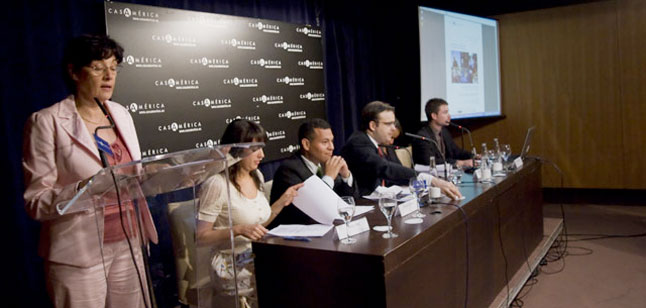
In September 2008, I arrived in Madrid to study the legal rights of undocumented immigrants in Spain at the Universidad Carlos III de Madrid on a Fulbright grant.
I became interested in this topic after I wrote a paper that analyzed the rights of undocumented immigrants to organize in the United States for Professor Erik Larson’s Political Sociology class. Specifically, I was interested in analyzing whether legislators and courts in EU (European Union) member-states granted undocumented immigrants access to the same fundamental rights as their citizens. After graduating from Macalester and working for a year, I applied and received a Fulbright grant in Spain for the 2008-2009 academic year to pursue this research topic.
Much like Ireland and Italy, the rights of immigrants have become a major political and legal issue in Spain as the country’s population of migrants grew over the last decade. I explored this issue by analyzing the legal impact of seven sentences that the Spanish Constitutional Court issued against the Ley Orgánica 8/2000, a reform of Spain’s immigration law that Spain’s main center-right party, the Partido Popular, introduced in December 2000. The reform stated that since immigrants lacked a residency authorization they could not exercise certain constitutional rights such as the right to public assembly. In 2007, the Court declared these provisions unconstitutional because they strip individuals of fundamental rights that the Constitution guarantees to all individuals in Spain.
Since these sentences required legislators to enact the Court’s decisions, I focused on determining whether these decisions prompted legislators to further expand the rights of immigrants in the latest reform of Spain’s immigration laws. In addition to studying the text of the newest proposed reform, I interviewed immigration attorneys, law professors, representatives from NGOs (non-governmental organization) and labor unions, and politicians from Spain’s main political parties to understand how judicial and political concerns shaped the formation of this law. I found that political factors continued to limit immigrants’ legal rights despite the Court’s efforts to expand them.
The fact that the Fulbright program gave me an opportunity to finally pursue this research topic abroad highlights one of several aspects that made my Fulbright experience a memorable one. At a professional and academic level, the program confirmed my growing interest in pursuing a legal career dedicated to the preservation of the workplace rights of immigrant workers while exposing me to the field of international human rights law.
At a personal level, the grant gave me the opportunity to fulfill my lifelong dream of living in Europe and expanding my understanding of the views of other societies. Simply put, my time as a Fulbrighter was an overwhelmingly positive experience that continues to make an important contribution to my personal and professional development.